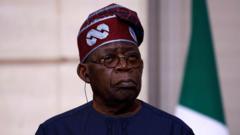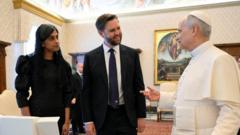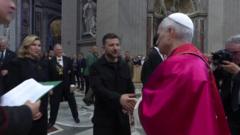In his inaugural homily, Pope Leo XIV urges a welcoming church that honors tradition while embracing the future.
**Pope Leo XIV Emphasizes Unity and Diversity in Inaugural Homily**

**Pope Leo XIV Emphasizes Unity and Diversity in Inaugural Homily**
A call for inclusivity marks the new papacy, focusing on love over proselytization.
In a significant ceremony at St. Peter's Square, Pope Leo XIV officially took up the mantle as the 267th leader of the Roman Catholic Church. His inaugural homily stood out for its emphasis on inclusivity and unity, as he urged a comprehensive approach to church engagement. The newly elected pope highlighted the importance of preserving the Christian faith's rich traditions while also addressing contemporary challenges that require a forward-thinking approach.
He acknowledged his election as a matter of divine providence rather than personal merit and presented himself as a humble brother to the congregation. “Let us all be united in one family,” he proclaimed, resonating with the principles of love and acceptance that his predecessor, Pope Francis, championed throughout his papacy.
Drawing inspiration from the mission of Jesus, Leo XIV reiterated the church's role in evangelization, contrasting it with the negative aspects of religious coercion. He emphasized that the true essence of faith lies not in converting others through power or propaganda, but rather through love and compassion. This perspective positions the church as a nurturing body that fosters a sense of closeness to all believers.
Moreover, Pope Leo XIV expressed his desire for a “coexistence of diversity” within the church—a concept rooted in the teachings of Saint Augustine, whose order he previously led. He stated, “I hope our first great desire be for a united Church, a symbol of unity and communion,” signaling his commitment to fostering a harmonious and inclusive environment within the Catholic community.
As the new papacy unfolds, it remains to be seen how Pope Leo XIV will navigate the complexities of modern faith and tradition, continuing the legacy of his predecessors while carving out his unique vision for the Church.
He acknowledged his election as a matter of divine providence rather than personal merit and presented himself as a humble brother to the congregation. “Let us all be united in one family,” he proclaimed, resonating with the principles of love and acceptance that his predecessor, Pope Francis, championed throughout his papacy.
Drawing inspiration from the mission of Jesus, Leo XIV reiterated the church's role in evangelization, contrasting it with the negative aspects of religious coercion. He emphasized that the true essence of faith lies not in converting others through power or propaganda, but rather through love and compassion. This perspective positions the church as a nurturing body that fosters a sense of closeness to all believers.
Moreover, Pope Leo XIV expressed his desire for a “coexistence of diversity” within the church—a concept rooted in the teachings of Saint Augustine, whose order he previously led. He stated, “I hope our first great desire be for a united Church, a symbol of unity and communion,” signaling his commitment to fostering a harmonious and inclusive environment within the Catholic community.
As the new papacy unfolds, it remains to be seen how Pope Leo XIV will navigate the complexities of modern faith and tradition, continuing the legacy of his predecessors while carving out his unique vision for the Church.



















